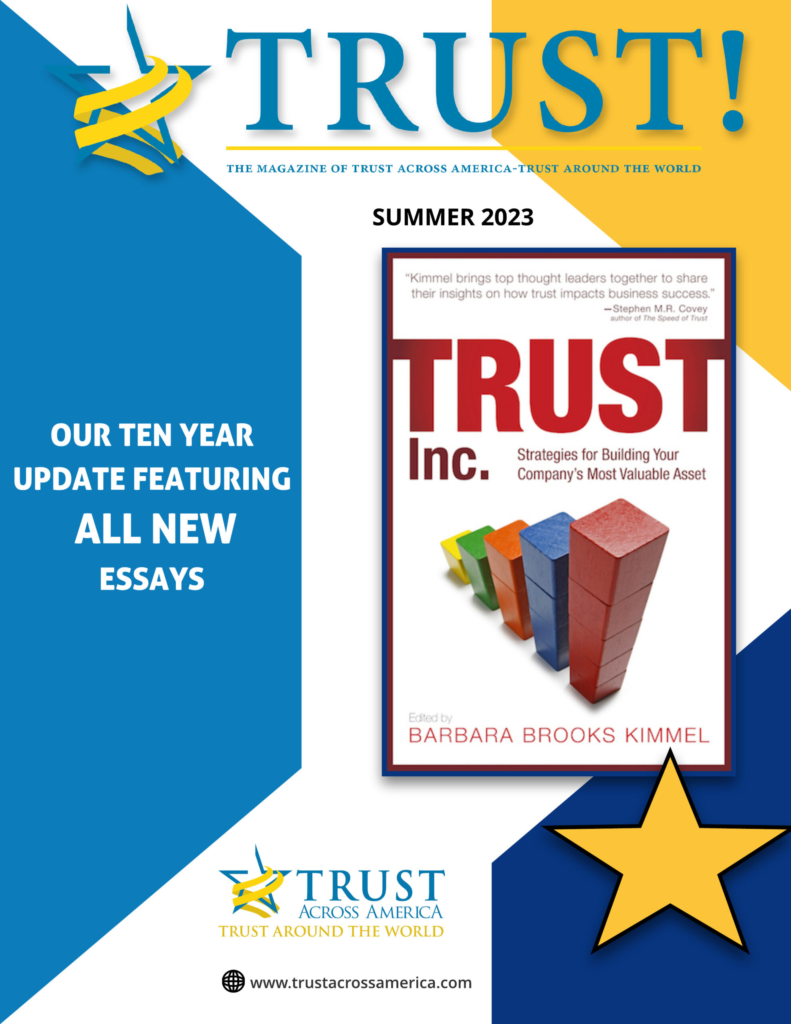
Contrary to what many executives are lead to believe, trust is not a “soft” skill. In fact in today’s challenging business environment it may mean the difference between survival and failure. Trust impacts an organization in multiple ways, from profitability to workplace stress and wellness, stakeholder relationships, regulatory costs and beyond. The following represents some of the more current and less biased research/surveys supporting the business case for trust:
Profitability:
According to the proprietary FACTS® Framework research conducted by Trust Across
America-Trust Around the World, over a 10-year period the most trustworthy public
companies outperformed the S&P 500. 2022
Companies that actively and consistently build trust amongst consumers across their
entire spectrum of brands gain greater marketing efficiency. They face fewer
headwinds in marketing and selling their products and services, have more effective
advertising due to higher believability, and can charge a premium for their products.
Ipsos Mori Trust the Truth, September, 2019
Accenture Strategy Global Consumer Pulse Report surveyed 24,877 consumers
worldwide about their evolving expectations towards companies. Lack of trust costs
global brands $2.5 trillion per year. This compares to $756 billion lost by U.S.
companies and 41 percent loss of clients. 2017
Research shows that 30% of a company’s value is at risk where trust is broken with the
public and external stakeholders. Those CEOs who have a proactive approach to crisis
planning view simulation training and drills as an investment. They also see it as a way
to test and build the trust and confidence of their teams. It hones and develops
leadership and communication skills, builds coherence and cross-functional support. McKinsey & Company research in Connect: How companies succeed by engaging radically with society 2015 – John Browne, Robin Nuttall, Tommy Stadlen
Employee Engagement:
According to Gallup, when employees don’t trust organizational leadership, their
chances of being engaged are one in twelve. But when that trust is established, the
chances of engagement skyrocket to better than one in two. A highly engaged
workforce means the difference between a company that outperforms its competitors
and one that fails to grow. Currently 31% of the working population are engaged.
Taking into consideration three Gallup measures of employee engagement this year,
the overall percentage of engaged workers during 2020 is 36%. July, 2020
Workplace Stress & Wellness:
Research on the link between trust and wellness in SmartBrief article. 2020
The level of trust in the work environment is also associated with increased
adjusted odds of having cardiovascular disease. International Journal of
Environmental Research, 2019
Research from 2018 suggests that “trust and perceived support are both significant
predictors of mental and physical health, job satisfaction and turnover intentions.
However, the support at the team level is a more important predictor, while trust is
a stronger predictor at the organizational level. Italian Society of Occupational
Medicine, 2018
According to PwC, when we look at employees, 22% have left a company because of
trust issues and 19% have chosen to work at one because they trusted it highly. In
other words, one out of five of your employees who leave don’t do so primarily for a
better salary or position. They leave because they don’t trust your company. PwC Trust
in US Business Survey, August 2021
Improved Stakeholder Relationships:
Only 7 percent of Americans believe that major company CEOs have high ethical
standards, and only 9 percent have a very favorable opinion of major companies.
Only 42 percent Americans trust major companies to behave ethically, down from
47 percent last year. Public Affairs Council, 2018
Regulatory Costs:
The Competitive Enterprise Institute reports that The cost of Federal Regulations is
approaching $2 trillion annually. To put that number in perspective, if U.S.
regulations were an economy, it would be larger than Canada’s entire GDP and the
eighth largest in the world. The regulatory state costs more than the U.S.
government collects from income taxes. It’s almost equal to all corporate pretax
profits earned in 2016. Investor’s Business Daily April 19, 2021
Barbara Brooks Kimmel is an author, speaker, product developer and global subject matter expert on trust and trustworthiness. Founder of Trust Across America-Trust Around the World she is author of the award-winning Trust Inc., Strategies for Building Your Company’s Most Valuable Asset, Trust Inc., 52 Weeks of Activities and Inspirations for Building Workplace Trust and Trust Inc., a Guide for Boards & C-Suites. She majored in International Affairs (Lafayette College), and has an MBA (Baruch- City University of NY). Her expertise on trust has been cited in Harvard Business Review, Investor’s Business Daily, Thomson Reuters, BBC Radio, The Conference Board, Global Finance Magazine, Bank Director and Forbes, among others.


Recent Comments